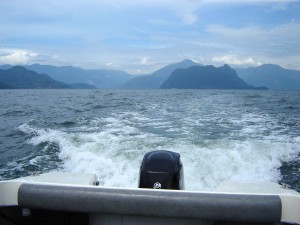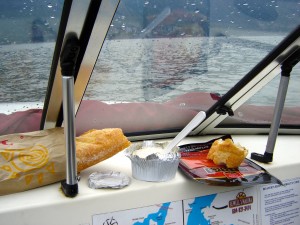I care deeply about my characters’ emotions. Some readers have opined that I care too much—that I describe emotion too lingeringly, in prose that occasionally verges on indigo. Jaele’s numbness—because it’s a self-defense mechanism, and just as important as the grief it keeps her from feeling. Nola’s helpless rage. Ariadne’s jealousy. There’s love too, obviously: all kinds of it, from unrequited to urgent to waning to steady to tortured. I try to be at least a little inventive about whichever emotion I’m attaching words to—because the path to writing emotions is hard, and littered with clichés.
Fear, though—fear is one emotion I might have treated with unwitting carelessness. I realized this in June, on a motorboat in Howe Sound. Or, in fact, a the day before, on the cliff walk near the Capilano Suspension Bridge. (I could actually go all the way back to the plane, but I’ve mentioned my fear of flying before, if in vague terms.)
How have I described fear, in my writing? A hammering heart. Blood pounding in the ears. (Though this can be anger, too.) Sweaty palms. A fluttery pulse. Sudden dizziness. A dropping-away of the ground beneath the feet.
And yet as the ground dropped away beneath mine, on that cliff walk, I felt none of those things. They were probably happening—the thudding heart and dizziness—but all I was really aware of was a strange sort of trembling in my chest and a desperate desire never to let go of the cables on either side of me, never to lift my feet. So I clutched and shuffled, camera swinging from my wrist, casting furtive glances at the splendour above and below me. My brain felt like it was splintering into pieces of wildly differing sizes, each with its own volume setting: My god that’s beautiful rock, striated—what a weird word, “striated”—trees growing out of it; I CAN’T I CAN’T; my god that’s beautiful water foaming down there, boulders, more trees, taller than any I’ve ever seen before; I can’t believe how high up can’t believe it, shouldn’t be so high up; LOOK ONLY AT YOUR FEET ignore everything that’s swirling around in your peripheral vision trying to pull you over and down; for CRAPSSAKE…
And then there was the motorboat.
“It’s pretty choppy out there,” said one of the girls who worked at the marina. “Really windy. Not the best day. Actually, we’re going to give you a bigger boat.” But my intrepid husband had a distinct spring in his step, as he made for the boat in question: he spent years making this trip to Anvil Island to count seals, and was eager to introduce me to their descendants. He never did. About half an hour out of Horseshoe Bay, as the far-too-wee boat pitched and yawed in waves that looked deceptively modest from shore but were, in reality, white-capped and vicious, I blurted, “I can’t do this!” in a warbly, wobbly voice that carried beautifully over the wind and motor noises. I could barely feel my fingers, which were digging into the vinyl seat beneath me. My hair and face were soaked. Mountains towered on our right, Anvil Island loomed not that far ahead, the grey ocean water churned—so beautiful, one brain-splinter noted, but another, louder one made a wordless noise that just wouldn’t stop. And that thing was happening in my chest again: deep in there, and all the way through, not just where my heart was. Supersonic shock waves. Dizziness that had somehow gotten lost on its way to my head.
I’d tried, in that half-hour. Thought: I can’t believe how much of a doofus you are. What’s wrong with you? I looked at Peter, just like I look at other people on planes—people who read magazines or watch movies or sleep (what the HELL is that about?) even as condensation spreads around that tiny hole in the window (the hole that’s obviously supposed to be there, but come on) and the seatbelt sign dings on, about 30 seconds after I’ve felt that surge that presages turbulence. I look at those people on the plane; I looked at Peter as he drove the boat, and urged myself to be that completely OK with things. But far above the ground, and apparently out on the ocean, I just can’t be. The wind, the water—much too big. Myself—much too small. I’m afraid.
The things I put my characters through! The danger, the drama—and their hearts hammer for a bit, and they wipe their sweaty palms on their skirts, and maybe their voices shake. I’m not sure I’ve ever come close to describing profound fear—probably because I’m fortunate enough not to experience it all that often.
Peter turned the boat around, in a wide arc that had us rising and hitting hard whenever the waves struck us broadside. He cut the motor in the lee of Bowyer Island. The boat rocked, but much more innocuously. The sensation in my chest ebbed, leaving me feeling hollow and light. My hand shook as I tore off the first chunk of fresh baguette; two chunks later, it didn’t.







Recent Comments